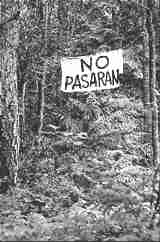By Bob
By Bob
How I saved Clayoquot
When I first saw a rough cut of Sulphur Passage, it brought a lump to my cynical, old throat. Since then it has had that effect on hundreds, maybe even thousands, of others. But the big thing is, it played a significant role in saving the Clayoquot wilderness. And I don't mean in a vague, inspire-the-troops kind of way. Sulphur Passage was used strategically and effectively at a pivotal time in the struggle. A turning point, really. How that came about is an instructive tale, at least for those interested in the part art can play in political struggle.
I have written about the full sweep of the 20-year fight for Clayoquot Sound in The Clayoquot Women. The blockade at Sulphur Pass, for which I wrote the song, took place in the summer of 1988, about 10 years in. Unfortunately, I'm a slow writer and by the time the song was done, the summer and the blockade were over and all the protesters and loggers had packed it in. Not to worry, there would be more blockades, including a massive summer-long protest in 1993. That "Clayoquot summer," as it was called, saw the arrest of over 800 people for civil disobedience, the highest number Canadian history. I remember singing Sulphur Passage on a logging road at dawn, standing on a stage made of a sheet of plywood lashed to the top of a VW van.
Alas, despite the massive protests, by 1994 the struggle seemed lost. The government of British Columbia - an NDP government, sigh - had dug in its heels. They had approved the cutting of 75% of the Clayoquot forest, and 75% was going to be cut! Everyday more of the ancient forest fell. After a 15-year campaign involving tens of thousands of people, the effort to save Clayoquot had hit a stone wall. Unfazed - well, despite being fazed - a few of the protest leaders devised a new strategy. If the government wouldn't respond to pressure, how about the logging company? MacMillan Bloedel was Canada's biggest forest company. But, powerful as it was, like any business, it depended on its customers. What, the campaigners reasoned, if they pressured the companies who bought MB's paper? How they found out who those purchasers were is a story in itself. (Binoculars played a significant role.) Once MB's key customers were identified, the campaigners set up meetings with them.
Did you know, the campaigners would ask the VP of Pacific Bell, the New York Times or Kimberley Clark, that your phone books, newspapers, or toilet paper are made from the last stands of ancient temperate rainforest? Surely your company wasn't aware at this, and if it is, surely your customers would be shocked to find out. Wouldn't it be better to simply buy paper that didn't pulp some of the last 1000-year-old trees in North America? Envisioning Greenpeace campaigners hanging banners from the roof of corporate headquarters accusing them of pillaging the wilderness, the VPs felt the persuasiveness of the argument. Macmillan Bloedel's biggest paper buyers began to call in to ask what was going on, and to indicate that they didn't want to become targets for Clayoquot protests. To make a long story very short, MB was forced to the bargaining table and, in the end, agreed to stop its Clayoquot operations. The BC government's decision was simply bypassed.
So the market campaign, as this strategy was called, was pivotal. What I didn't know until years later was that campaigners began those crucial meetings with MB's customers by showing Sulphur Passage. "It was perfect," recalls Tzeporah Berman, one of the leaders of the market campaign. "In four minutes, it showed them what clear-cut logging looked like; it showed them that we weren't just a few environmental zealots - there were thousands of us. And it was just so moving. I remember the vice-president for purchasing at a big Japanese company watching with tears in her eyes."
So I figure I saved Clayoquot Sound. I had help, of course. From Nettie Wild, who directed Sulphur Passage and Paul Livesay, who edited it. From all the musicians and singers, among them Valdy, Raffi, Ann Mortifee, Stephen Fearing, Rick Scott, Roy Forbes, Jennifer West and Veda Hille. And from the thousands of others who did the thousands of things that inspired our shoe-string production. They built the stage upon which Sulphur Passage played. Then we set the stage for the next actors. And thus was won one of the world's great David-vs-Goliath, environmental victories. Margaret Mead had it right: Never doubt that a small group of thoughtful, committed citizens can change the world. Indeed, it's the only thing that ever has. For more of the story of the Clayoquot campaign see The Clayoquot Women.
